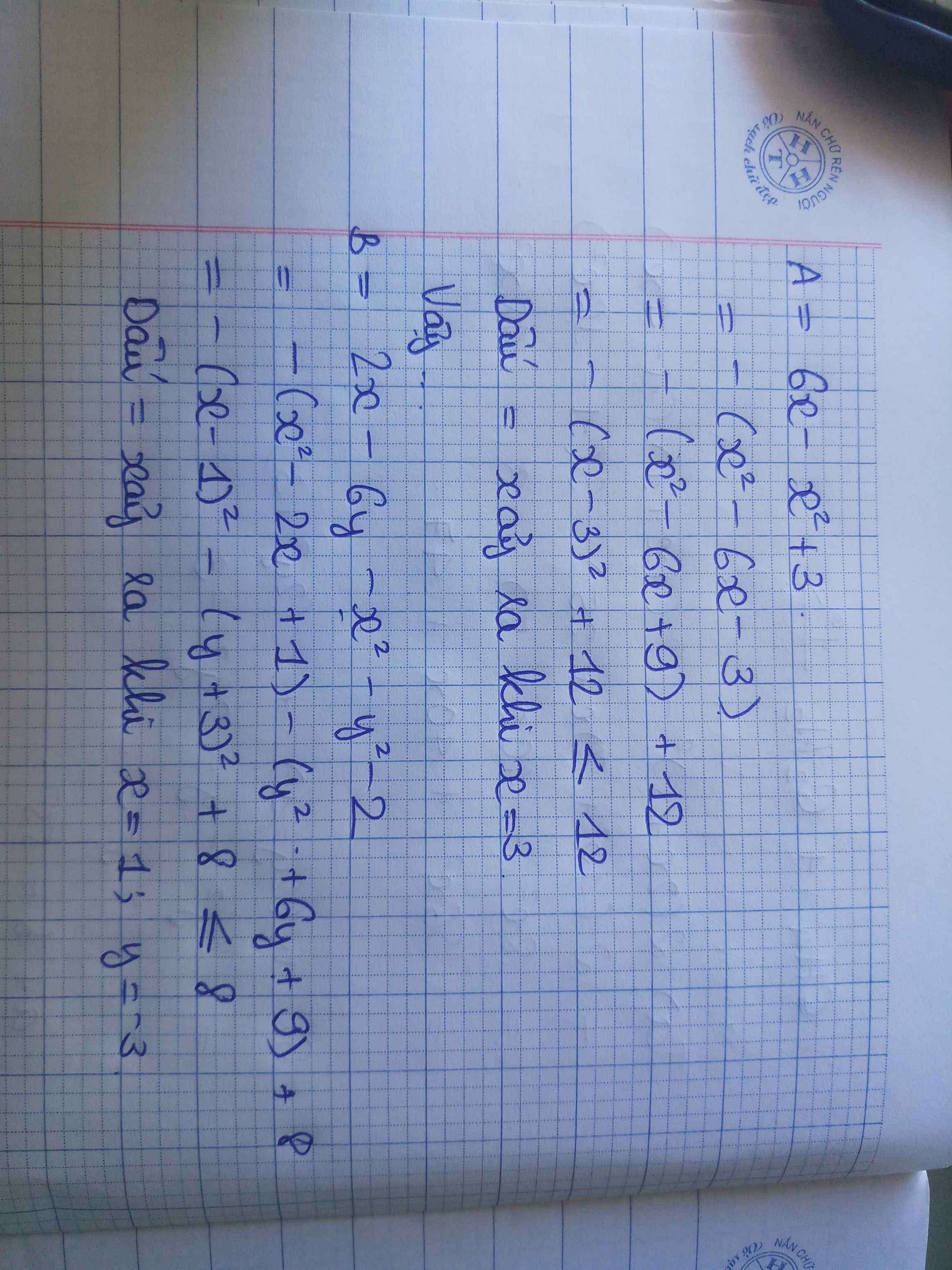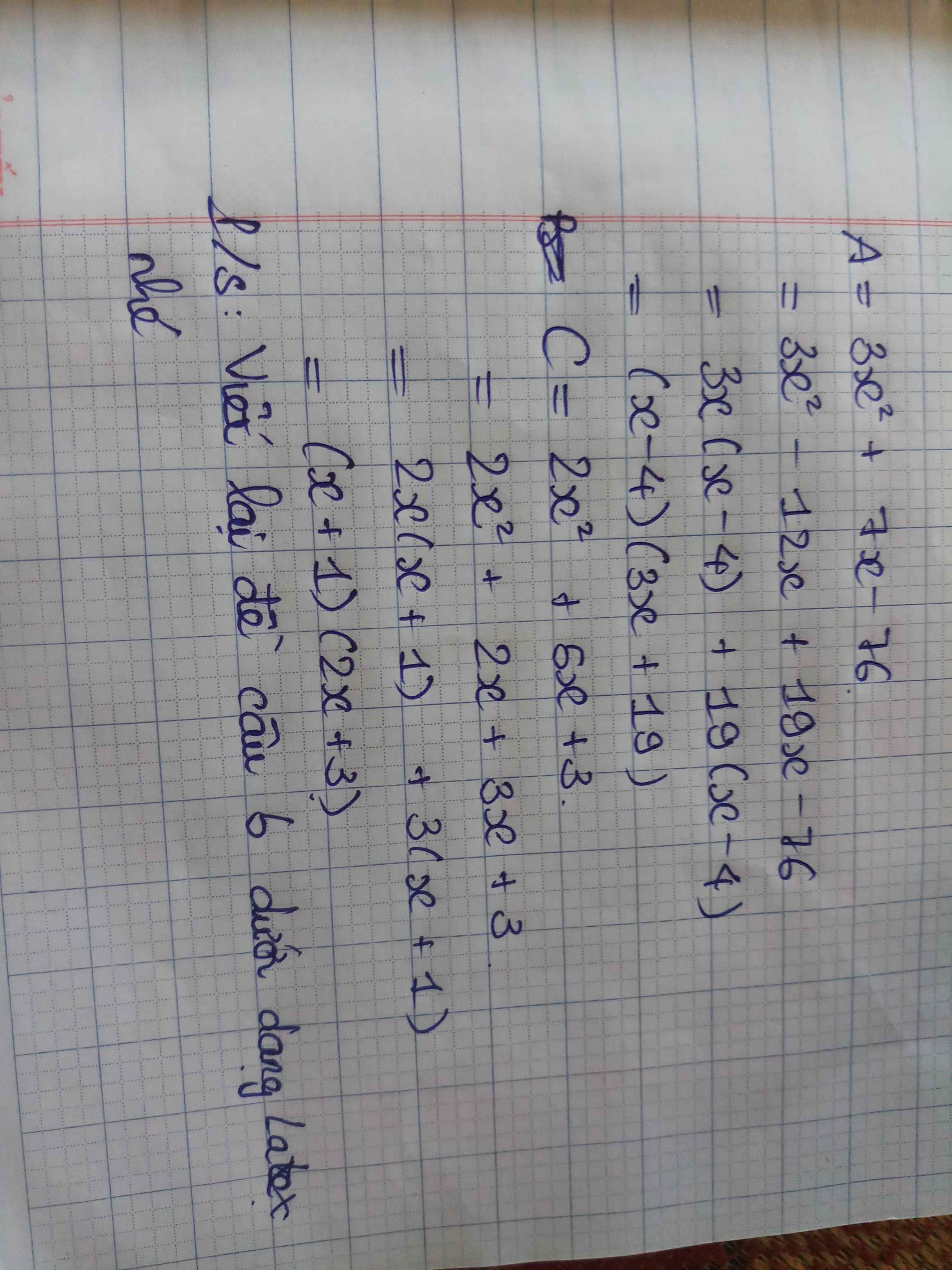
Hãy nhập câu hỏi của bạn vào đây, nếu là tài khoản VIP, bạn sẽ được ưu tiên trả lời.


\(A=4-6x-x^2=-\left(x^2+6x-4\right)=-\left(x^2+6x+9-13\right)\)
\(=-\left[\left(x+3\right)^2-13\right]=-\left(x+3\right)^2+13\le13\)
Vậy \(A_{max}=13\Leftrightarrow x+3=0\Leftrightarrow x=-3\)
\(B=3x^2-6x+1=\left(\sqrt{3}x\right)^2-2.\sqrt{3}x.\sqrt{3}+3-2\)
\(=\left(\sqrt{3}x-\sqrt{3}\right)^2-2\ge-2\)
Vậy \(B_{min}=-2\Leftrightarrow\sqrt{3}x-\sqrt{3}=0\Leftrightarrow x=1\)
\(C=5x^2-2x-3=\left(\sqrt{5}x\right)^2-2.\sqrt{5}x.\frac{1}{\sqrt{5}}+\frac{1}{5}-\frac{16}{5}\)
\(=\left(\sqrt{5}x-\frac{1}{\sqrt{5}}\right)^2-\frac{16}{5}\ge-\frac{16}{5}\)
Vậy \(C_{min}=-\frac{16}{5}\Leftrightarrow\sqrt{5}x-\frac{1}{\sqrt{5}}=0\Leftrightarrow\sqrt{5}x=\frac{1}{\sqrt{5}}\Leftrightarrow x=\frac{1}{5}\)

2: =(2x+1)^2-y^2
=(2x+1+y)(2x+1-y)
3: =x^2(x^2+2x+1)
=x^2(x+1)^2
4: =x^2+6x-x-6
=(x+6)(x-1)
5: =-6x^2+3x+4x-2
=-3x(2x-1)+2(2x-1)
=(2x-1)(-3x+2)
6: =5x(x+y)-(x+y)
=(x+y)(5x-1)
7: =2x^2+5x-2x-5
=(2x+5)(x-1)
8: =(x^2-1)*(x^2-4)
=(x-1)(x+1)(x-2)(x+2)
9: =x^2(x-5)-9(x-5)
=(x-5)(x-3)(x+3)

Giải như sau.
(1)+(2)⇔x2−2x+1+√x2−2x+5=y2+√y2+4⇔(x2−2x+5)+√x2−2x+5=y2+4+√y2+4⇔√y2+4=√x2−2x+5⇒x=3y(1)+(2)⇔x2−2x+1+x2−2x+5=y2+y2+4⇔(x2−2x+5)+x2−2x+5=y2+4+y2+4⇔y2+4=x2−2x+5⇒x=3y
⇔√y2+4=√x2−2x+5⇔y2+4=x2−2x+5, chỗ này do hàm số f(x)=t2+tf(x)=t2+t đồng biến ∀t≥0∀t≥0
Công việc còn lại là của bạn !
\(\left(x+6\right)\left(2x+1\right)=0\)
<=> \(\orbr{\begin{cases}x+6=0\\2x+1=0\end{cases}}\)
<=> \(\orbr{\begin{cases}x=-6\\x=-\frac{1}{2}\end{cases}}\)
Vậy....
hk tốt
^^

Bài 5:
a) \(A=x^2-4x+9=\left(x^2-4x+4\right)+5=\left(x-2\right)^2+5\ge5\)
\(minA=5\Leftrightarrow x=2\)
b) \(B=x^2-x+1=\left(x^2-x+\dfrac{1}{4}\right)+\dfrac{3}{4}=\left(x-\dfrac{1}{2}\right)^2+\dfrac{3}{4}\ge\dfrac{3}{4}\)
\(minB=\dfrac{3}{4}\Leftrightarrow x=\dfrac{1}{2}\)
c) \(C=2x^2-6x=2\left(x^2-3x+\dfrac{9}{4}\right)-\dfrac{9}{2}=2\left(x-\dfrac{3}{2}\right)^2-\dfrac{9}{2}\ge-\dfrac{9}{2}\)
\(minC=-\dfrac{9}{2}\Leftrightarrow x=\dfrac{3}{2}\)
Bài 4:
a) \(M=4x-x^2+3=-\left(x^2-4x+4\right)+7=-\left(x-2\right)^2+7\le7\)
\(maxM=7\Leftrightarrow x=2\)
b) \(N=x-x^2=-\left(x^2-x+\dfrac{1}{4}\right)+\dfrac{1}{4}=-\left(x-\dfrac{1}{2}\right)^2+\dfrac{1}{4}\le\dfrac{1}{4}\)
\(maxN=\dfrac{1}{4}\Leftrightarrow x=\dfrac{1}{2}\)
c) \(P=2x-2x^2-5=-2\left(x^2-x+\dfrac{1}{4}\right)-\dfrac{9}{2}=-2\left(x-\dfrac{1}{2}\right)^2-\dfrac{9}{2}\le-\dfrac{9}{2}\)
\(maxP=-\dfrac{9}{2}\Leftrightarrow x=\dfrac{1}{2}\)

Lời giải:
a.
a. $(x-1)(x+2)-(x-3)(x+1)=5x-3$
$\Leftrightarrow (x^2+x-2)-(x^2-2x-3)=5x-3$
$\Leftrightarrow 3x+1=5x-3$
$\Leftrightarrow 4=2x$
$\Leftrightarrow x=2$
b.
$(2x-1)(x+3)-(x-2)(x+3)=3x+1$
$\Leftrightarrow (2x^2+5x-3)-(x^2-4)=3x+1$
$\Leftrightarrow x^2+5x+1=3x+1$
$\Leftrightarrow x^2+2x=0$
$\Leftrightarrow x(x+2)=0$
$\Leftrightarrow x=0$ hoặc $x=-2$
c.
$x^2(x-1)-x(x-1)(x+1)=0$
$\Leftrightarrow x^2(x-1)-(x^2+x)(x-1)=0$
$\Leftrightarrow (x-1)[x^2-(x^2+x)]=0$
$\Leftrightarrow (x-1)(-x)=0$
$\Leftrightarrow x-1=0$ hoặc $-x=0$
$\Leftrightarrow x=1$ hoặc $x=0$
d.
$4x(x-5)-(2x-3)(2x+3)=9$
$\Leftrightarrow 4x^2-20x-(4x^2-9)=9$
$\Leftrightarrow -20x=0$
$\Leftrightarrow x=0$
a: Ta có: \(\left(x-1\right)\left(x+2\right)-\left(x-3\right)\left(x+1\right)=5x-3\)
\(\Leftrightarrow x^2+2x-x-2-x^2-x+3x+3-5x+3=0\)
\(\Leftrightarrow-2x+4=0\)
\(\Leftrightarrow2x=4\)
hay x=2
b: Ta có: \(\left(2x-1\right)\left(x+3\right)-\left(x-2\right)\left(x+2\right)=3x+1\)
\(\Leftrightarrow2x^2+6x-x-3-x^2+4-3x-1=0\)
\(\Leftrightarrow x^2+2x=0\)
\(\Leftrightarrow\left[{}\begin{matrix}x=0\\x=-2\end{matrix}\right.\)
c: Ta có: \(x^2\left(x-1\right)-x\left(x-1\right)\left(x+1\right)=0\)
\(\Leftrightarrow x\left(x-1\right)\left(x-x-1\right)=0\)
\(\Leftrightarrow\left[{}\begin{matrix}x=0\\x=1\end{matrix}\right.\)
d: Ta có: \(4x\left(x-5\right)-\left(2x-3\right)\left(2x+3\right)=9\)
\(\Leftrightarrow4x^2-20x-4x^2+9=9\)
hay x=0


A= X2+5X+25/4-37/4 =(X+5/2)2-37/4 >= -37/4
Amin=-37/4
Đạt được khi : X=-5/2
B=-X2+7X+1=-(X2-7X-1)=-(X2+7X+49/4-53/4)=-(X+7/2)2+53/4<=53/4
BMax=53/4
Đạt được khi:X=-7/2
C=2x2+6x=2x2+6x+9/4-9/4=2(x2+3x+9/4)-9/4=2(x+3/2)2-9/4>=-9/4
CMin=-9/4
Đạt được khi:x=-3/2